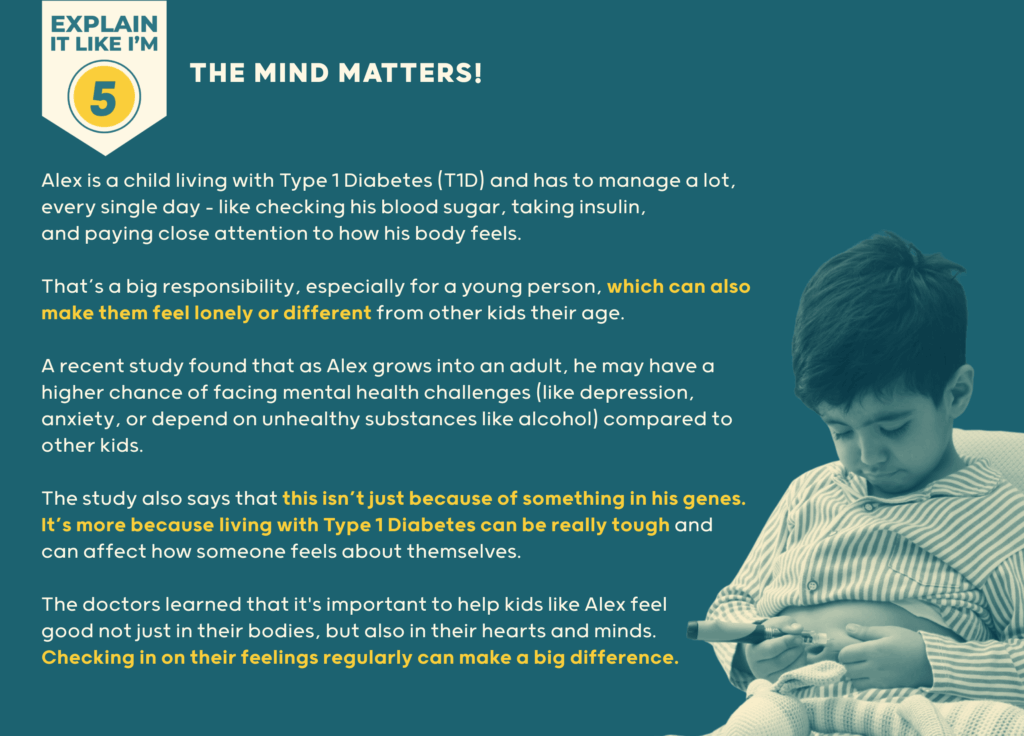Beyond Blood Sugar: The Lifelong Mental Health Impact of Childhood T1D.
D-coding the Article- : Childhood-onset type 1 diabetes and subsequent adult psychiatric disorders: a nationwide cohort and genome-wide Mendelian randomization study
Published Date:
17 July 2024
Published By:
Tomáš Formánek, Danni Chen, Zdeněk Šumník, Karolína Mladá, James Hughes, Stephen Burgess, Nicholas J Wareham, Graham K Murray, Peter B Jones, Benjamin I Perry
Approved By:
To be
Decoded By:
Divna Chandiramani
10 mins to read
- The T1D Takeaway
- People who get Type 1 Diabetes as kids have a higher risk of facing mental health challenges when they grow up. This can include feeling very sad or hopeless (depression), worrying too much (anxiety), or struggling with drugs or alcohol.
- This isn’t just about blood sugar—it’s also about the emotional weight of living with diabetes every day. Managing insulin, food, and routines from a young age can take a toll on how someone feels inside.
- That’s why diabetes care needs to go beyond the physical. Regular mental health check-ups, strong support systems, and access to emotional help are just as important as insulin and diet. A whole-person approach—caring for both body and mind—is key to helping people with T1D live well and feel well.
Word Wizard
- The study reveals a significant connection between having Type 1 Diabetes diagnosed in childhood and an increased risk of developing psychiatric disorders in adulthood. The increased risk includes conditions like depression, anxiety disorders, and substance use disorders.
- Compared to other populations, individuals with childhood-onset T1D demonstrated a lower rate of mental disorders.
- The study suggests that the increased risk is more likely due to the psychological challenges of living with T1D, rather than shared genetic factors.
- Regular mental health monitoring and assessments are crucial for individuals with childhood-onset T1D.
Summary Snap
Shots
This study suggests that the challenges of living with T1D, not just shared genes, likely contribute to this risk. Therefore, it’s crucial to monitor and support the mental well-being of individuals with childhood-onset T1D throughout their lives, alongside their physical health.
Prime Insight
Individuals with childhood-onset T1D face a significantly increased risk of developing various psychiatric disorders in adulthood. including depression, anxiety disorders, and substance use. Contrarily, individuals with childhood-onset T1D were less likely to develop mental disorders.
This study underscores the long-term, far-reaching impact of T1D, extending beyond immediate blood glucose management. It reinforces the need for a holistic approach to T1D care, integrating mental health monitoring and support alongside physical health management.
While genetic factors may play a role, the study suggests that the association is likely driven by other factors related to living with T1D.

Strong support systems, including access to mental health resources, are crucial for mitigating the potential mental health challenges faced by individuals with childhood-onset T1D.
Regular mental health monitoring and assessments are crucial for individuals with childhood-onset T1D.
The study found that the increased risk of most mental health problems in adults with childhood-onset T1D is likely due to the emotional challenges of living with T1D and its treatment, rather than shared biological causes.
Children diagnosed with Type 1 Diabetes face a significantly higher risk of developing mental health conditions like depression, anxiety, and substance use disorders as adults, but are less likely to develop other psychotic disorders.
- A Deeper Dive
- The Sources Voice
“We found that individuals diagnosed with T1D in childhood have a lower risk of developing psychotic disorders but a higher risk of subsequently developing the majority of other studied psychiatric disorders compared with children without T1D. Results for mood and anxiety disorders and behavioral syndromes were robust to reverse causality, selection and informative presence bias, and quantitative bias analyses implied that the results were unlikely to be fully explained by confounding”
- Curiosities Clarified
These are mental health conditions that people can develop as adults, such as depression, anxiety, substance use disorders, and other mental health challenges.
The study found a strong association between having childhood-onset T1D and an increased risk of adult psychiatric disorders. It does not definitively prove that T1D directly causes these problems. Other factors can also play a role.
Knowing about this connection helps healthcare providers and families be more aware of the potential mental health challenges that people with childhood-onset T1D might face. It encourages them to pay attention to mental well-being alongside physical health.
It means that doctors and caregivers should regularly check in with individuals who had childhood-onset T1D to see how they are doing emotionally and mentally. They should be aware of any signs of depression, anxiety, or other mental health concerns.
This is a complex research method that uses genetic information to try and understand if there is a causal link between two things. In this case, it was used to help determine if the connection between T1D and mental health issues could be due to shared biological factors.
This study highlights that T1D can have long-term effects beyond just managing blood sugar. It emphasizes the importance of a holistic approach to T1D care, including addressing mental health needs.
Seek professional help. Talk to a doctor, therapist, or mental health specialist. There are many resources available to support mental well-being.

1 Comment
k1jogc